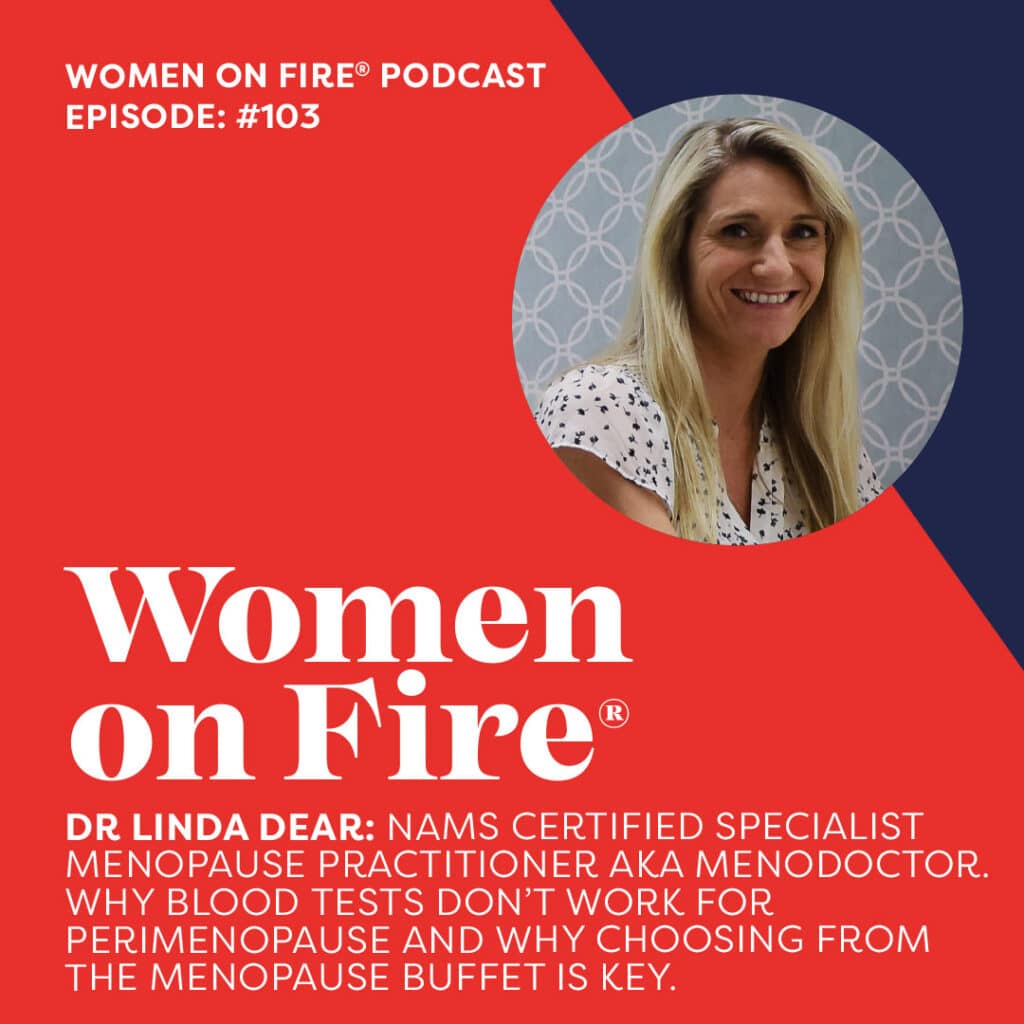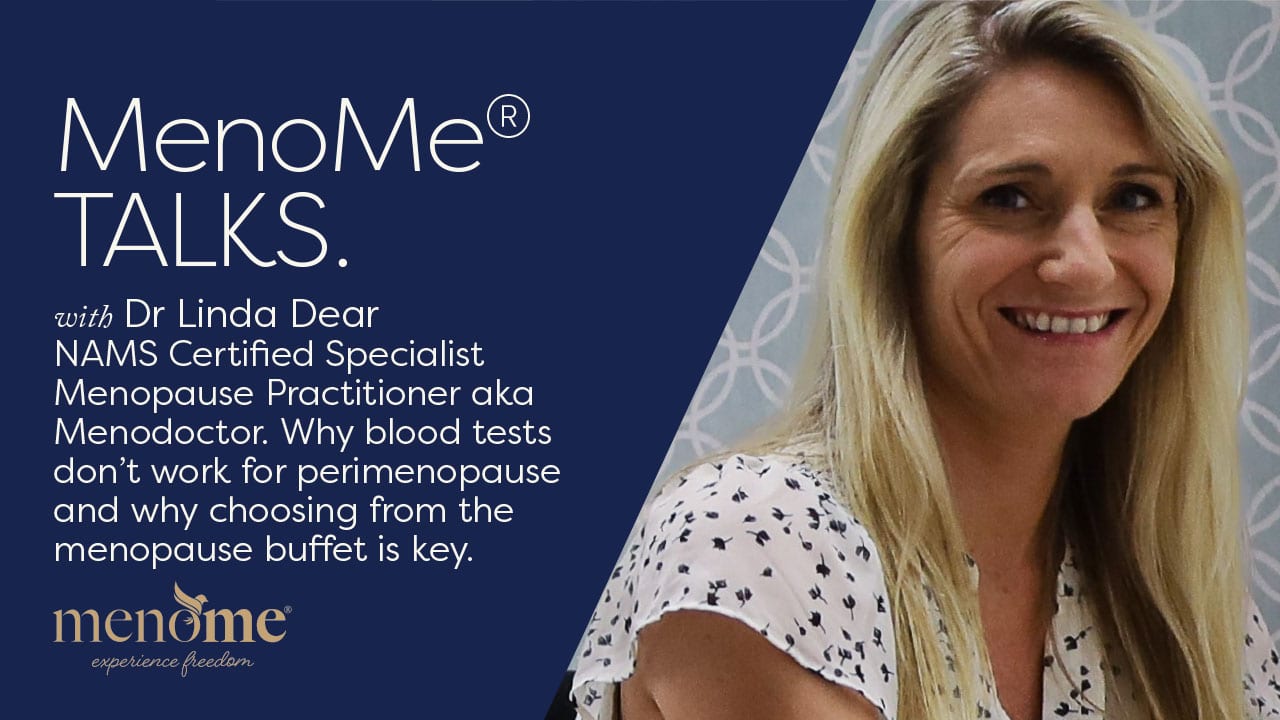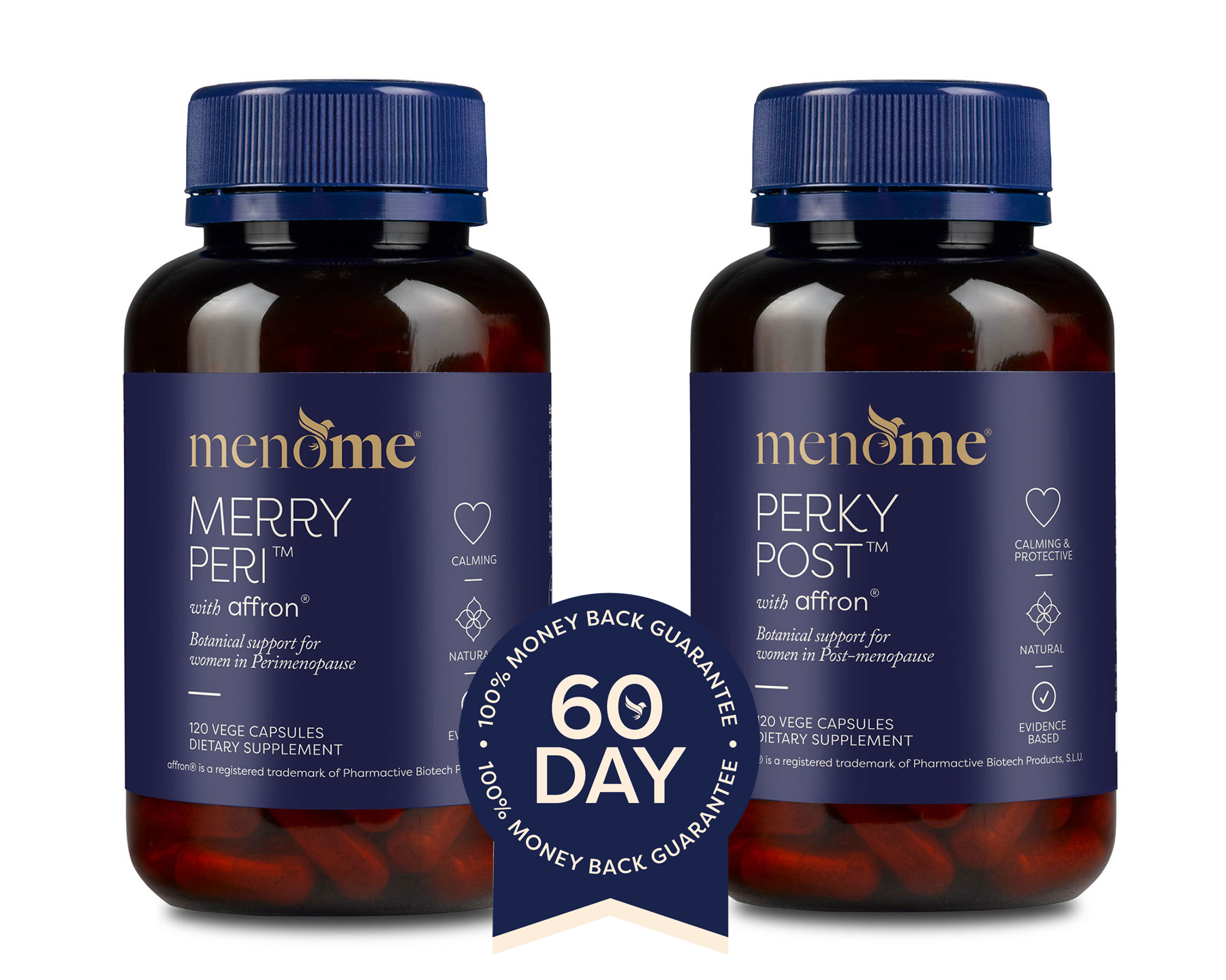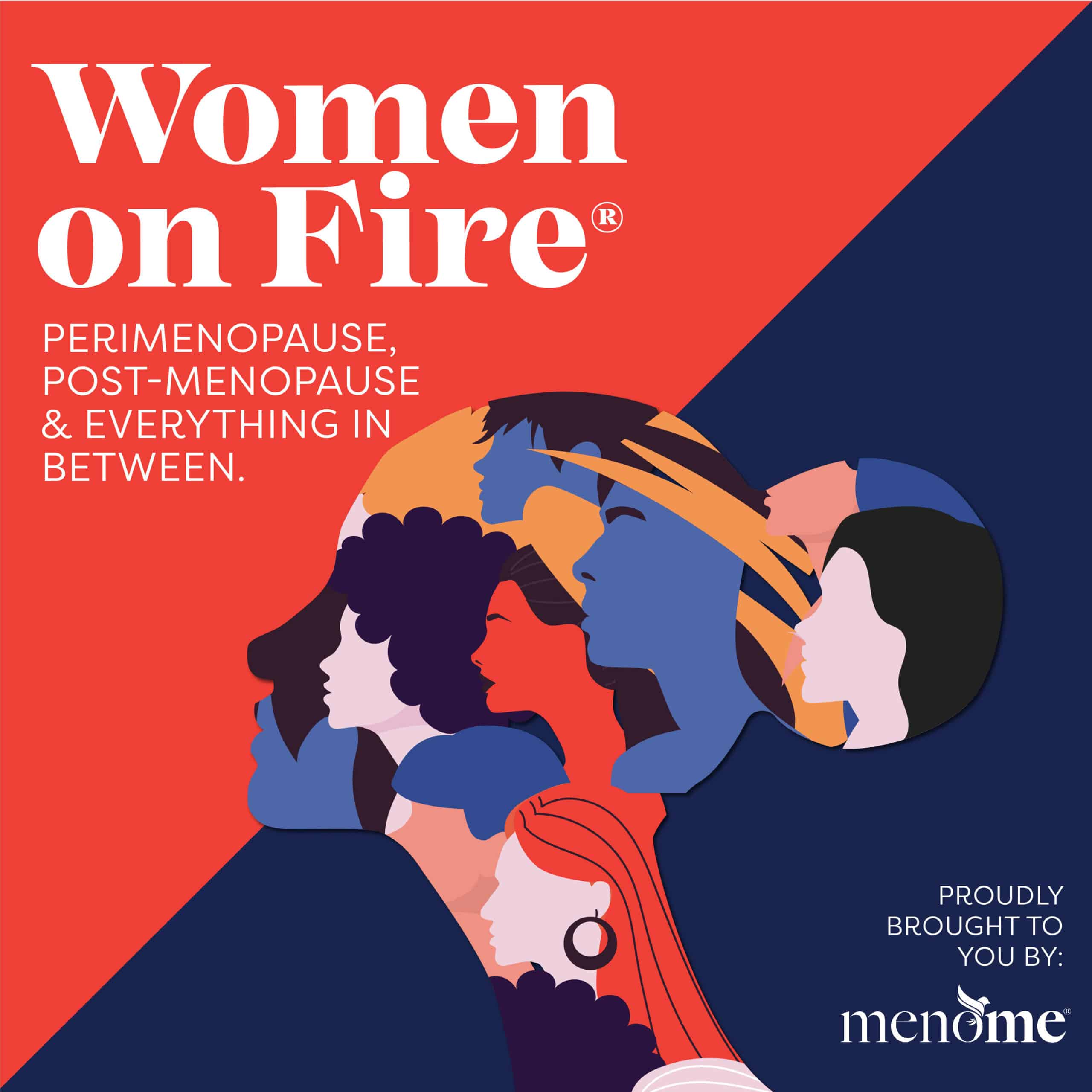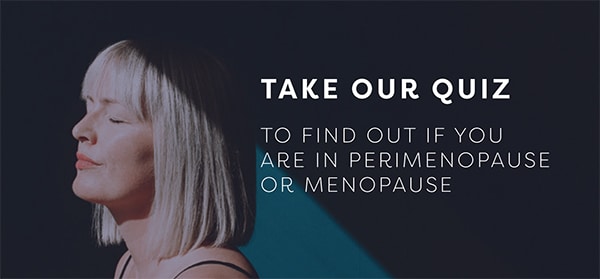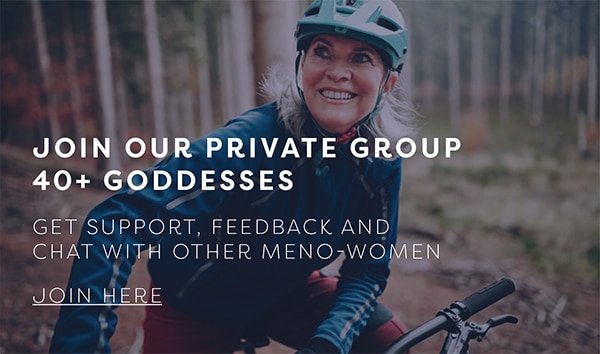Podcast Interview
In this episode we talk about:
- NAMS, psychology, yoga & med school (1:10)
- Women in perimenopause & turning 40 (3:08)
- Becoming the Menodoctor (3:50)
- Medicine’s blind spot: perimenopause (5:02)
- The psychological impact of peri (6:59)
- So much more research is needed (11:11)
- There is no test for perimenopause (15:29)
- What is your ‘Menopause Moment’? (16:30)
- What if you bleed 12 months after your Menopause Moment when you are officially post-menopause? (22:55)
- How to talk to your GP (25:28)
- The symptoms of peri (31:26)
- The Menopause Buffet – treatment options and getting rid of false friends (37:00)
- The main course of the buffet (41:52)
- The Australia and New Zealand MenoSurvey (46:54)
Episode Resources:
Ginger water recipe
The Australasian Menopause Society (AMS).
Take part in the Australasian MenoSurvey here.
You can follow Dr Linda Dear on Instagram here.
Or visit her website here.
Video version
Podcast Transcript
Jenna:
Today our guest is the lovely Dr Linda Dear who is also known as the Menodoctor.
There’s a body called the North American Menopause Society which we called NAMS for short – N-A-M-S. And she has trained as a specialist menopause doctor with them. I’m going to ask her to explain what that is but she’s also got an incredible background that covers everything from holistic to medical school.
So, could we talk a little bit about your journey Linda?
Dr Linda:
My journey…I suppose the scenic route to med school because it took me a while to kind of figure out that that’s actually what I wanted to do. And so the first thing I did in life was psychology. So that was my first calling and I did a psychology degree, then worked in research for a bit. As a psych research psychologist. That was in London.
And then I got itchy feet and thought ‘oh I want to do something in the fitness industry’. I was getting really into fitness and yoga myself. And I wanted to get out of the brain stuff and do body work. So then I did a personal fitness trainer course and a yoga teaching course.
I did that for a few years which I loved and then my brain got bored I suppose. It was fascinating stuff but my brain was like ‘oh come on let’s do something brainy again’. So that’s when I started to think about med school.
I was in my late 20s by then and thought I’m too old. And it turns out I wasn’t. So, then I became a doctor. I was in training for several years and there was no time to do anything else. I then became a GP, moved to New Zealand as well and had my two little boys.
And working as a GP, I started to see so many women in perimenopause and menopause, but particularly perimenopause. I think of all the blind spots in medicine that’s probably one of the biggest. And for me, it was so clear. And then it hit me as soon as I crossed the line of 40. As a result, I started not to feel right, I started to feel tired, and I started to get sweaty at night. And it takes a while to recognise it even if you’re a doctor. So, then I thought ‘well this is so big’. And it brought out the psychology because there’s so much about it that’s about mental health. Then obviously there’s the lifestyle stuff as well because I was struggling to do my yoga. I was hurting and that propelled me to learn more and to help other people as well as help myself.
So then I started to try and figure out how could I become a menopause doctor. It exists in England more so than here. So I started looking for courses and mostly you had to be in the country that was delivering the training. I’d already joined the North American Menopause Society and you could become a certified practitioner with them if you passed an exam. So, I applied, got their big book and passed the exam. And around that time, I also started the Menodoctor clinic which is a private clinic that is about perimenopause and menopause.
Jenna:
When was that? Could we just backtrack back a bit to when you were seeing patients before you experienced some changes yourself? And you were saying a lot of women will go to the doctor and get told they’re too young or their symptoms won’t get recognised. So you recognised them? How did you recognise them?
Dr Linda:
Well, I’ve got to be honest and I didn’t recognise them at first. Even now I want to go back in time and see all those women again because I know that I was missing it. When was the moment I started to see it? Because it’s funny, isn’t it? You probably know this, once you start seeing it [peri/menopause], it’s quite obvious.
Suddenly you think ‘well this is perimenopause’ and it all slots into place. But that blind spot is so big I don’t know when the turning point was. I suppose it must have been when I started to have some symptoms myself because I didn’t recognise them straight away. So, it must have been hitting 40. For me, everything seemed to go downhill.
You think 40 is going t be great but sometimes it’s not. So, I think that was the turning point. Hitting 40 and my taste of it and suddenly my eyes were open. And there were so many women sitting in front of me. They’d start talking and I’d think ‘this is hormones. Even if you’ve got no hot flushes, even if you still have in your periods’. Put all the pieces together and you can start to see it.
Jenna:
It must be helpful to have your psychology background as well because it’s not just physical symptoms, it’s the emotional/psychological symptoms as well, isn’t it? I mean they’re huge.
Dr Linda:
I say this all the time and I did a post on this – hormones mess with our heads. I think most women know that and when they start going a bit berserk in perimenopause their brains feel it a lot. We name these hormones sex hormones or reproductive hormones but that is such a limited view of what they do as hormones. Yes, they’re very important for periods and making babies but that’s not all they do in a woman’s body and her brain. They do lots of other things for us so when they fluctuate, we can feel it in different parts of us. And yet, the mood symptoms can be the first thing, they can be the major thing. There’s a tendency not to think about hormones if a woman has got mood symptoms. You’re not necessarily going to start asking about her periods or asking about hormones but we should be if that woman is 35 upwards.
That should be on our radar because there’s lots of research now that says the medications and treatments for mood disorders are not very appropriate and not as good if it’s a hormonal hormonally driven mood disorder or problem.
And I’d say anxiety is probably the most common thing I hear of women suddenly getting or worsening, it just comes out of nowhere. So women get scared to do stuff that they normally wouldn’t think twice about. Therefore it restricts what they’re doing in their lives and makes them nervous in their jobs to – say – even stand up in front of people. Suddenly you feel that nervousness and it’s quite frightening because you don’t feel like the same person.
So the mood impact of perimenopause and menopause is under-recognised because it’s massive. I remember in my psychology degree we didn’t talk much about hormones either.
Jenna:
When would you have done that? That would have been before the awareness there is today?
Dr Linda:
I was 19 so, 20 years ago. There’s a wonderful woman in Australia, Professor Kilkarni…
Jenna:
Oh yes, I know. I want to invite her to the show.
Dr Linda:
She’s awesome, isn’t she? She’s all about hormonal psychiatry becoming a recognised thing or reproductive depression as it’s sometimes called. Although it’s not just about depression, there’s lots of anxiety there too but she’s doing quite a lot in Australia to try and get that message out there within psychiatry.
Because doctors are seeing women and not thinking about hormones and they probably should. We can’t blame them for everything although it’s easy to sometimes, isn’t it? I mean they do a lot but she’s doing wonderful things. It’s a big part of perimenopause that needs more attention because we’re treating it the wrong way. Basically, a lot of women are on a merry-go-round of antidepressants and different things and nothing seems to be working. Even with great lifestyle stuff or counselling and mindfulness, something is missing sometimes.
Jenna:
More research is needed, isn’t it? Because there wasn’t a lot of research done historically, was there?
Dr Linda:
No, and most research on most things is based on men’s bodies. I remember while in psychology training we were always getting asked to be a participant in something so most experiments or research may be students who are asked to do it.
So, you’ve got 20-year-olds doing these cognitive tests or whatever it is. So, a lot of research is only as good as whoever the participants were, it represents them and their group, age or gender. But it may not be applicable to different ages, genders and different cultures even.
And women’s health in general hasn’t had enough research. I think one of the reasons – I might be wrong – but I’ve read this somewhere and we read all kinds of things but they say because women’s bodies are unpredictable and variable it’s very hard to control things and an experiment so they’ll use a man’s body because they’re basically the same every day. But we’re missing all the complexity.
Another analogy I love – you might have heard it is and I use it a lot with my patients – men are the sun, women are the moon. So, men are on a 24-day cycle. They get up when the sun rises, they do their thing and when the sun goes down they get tired and go to bed. Then they wake up and do it all over again. On the other hand, we are like the moon. We have a monthly cycle and – look at the moon – sometimes it’s big and shiny other times it’s a little slither. And sometimes it’s up in the daytime, it’s low and it’s high so we vary a lot. And there are times when we’re big and shiny and there are times when we just want to be left alone, to be a little slither and curl up in bed. And you can’t turn a moon into a sun and you can’t turn a sun into a moon but you can do the best with what you are. We are complicated and therefore not ideal research participants but we miss the magic and we never figure the magic out if we don’t look at it. We probably never will figure it all out though. I think that’s part of the mystery of us. There will probably always be some mystery which is part of our magic I think. Although we do need science on our side as well, we don’t want to be ignored.
Jenna:
No, exactly. And we do need a little more understanding but yes, that little bit of mystery is good as well.
Dr Linda:
I think so, I think there’ll be things we’ll never fully explain because women are so unique even amongst each other. You can’t put women in a big box and say ‘this is women’s thing and this is man’s thing’. Maybe this is not very nice to men but they vary as well, don’t they? You can’t say they’re all the same. But I feel like there’s even more richness and variety in females. Certainly from a doctor’s point of view when you look at women’s health and what women’s bodies can do.
Jenna:
Yes, they’re pretty incredible machines, aren’t they?
Dr Linda:
You could spend the whole five years at med school just doing women’s health. And maybe some of us should but we still wouldn’t know everything – a woman’s body and a woman’s mind is a more complicated thing. And it’s way more interesting really.
Jenna:
Well, we’re pretty amazing, I think! But one of the questions I get asked all the time and I think you do too because I’ve spoken with you about this. So women are going to their GPs and having blood tests, or they’re wanting to have a blood test to show if they’re in perimenopause and this is where we don’t have all the answers, isn’t it? And this is where we are complicated because there’s no test is there?
Dr Linda:
No, there’s no test for perimenopause. There is a test for menopause and – just so everyone knows – what those words mean when a doctor says them when anyone says them.
Menopause is your last ever period and there’s no more after that.
It gets tricky because they ask ‘what about women who’ve had hysterectomies or women who have Mirena’s who are not having periods anymore?’ We’ll talk about them in a sec, but if you’ve not got a Mirena and you’ve still got your womb we can say your last ever period is your ‘menopause moment’.
But sometimes you might think you’ve had your last one and then you have another one three months later so that’s why we can only define it after you’ve gone a whole 12 months without one.
So we don’t know you’re there until 12 months have gone by and then we look back and say that was your last ever period. That was your ‘menopause moment’.
So that’s what menopause is.
And then before we get to that moment, ovaries don’t just stop, they judder and shudder. Second puberty is another way of looking at it. Puberty is when they’re starting up, perimenopause is when they’re shutting down. And it can be a bit of a rough old ride because they [ovarian hormone production] don’t just stop, they fluctuate. The ovaries do their best for a bit they may get it a bit wrong sometimes. Indeed, they may give out too many hormones, other times they’re not giving out any so they’re all over the show…
… and just to go back to women who’ve had a hysterectomy it’s very hard to know when they hit menopause if they hadn’t hit it before.
Although it doesn’t make any difference to the options that a woman should have for treatment if she wants any kind of treatment because all the treatment options for perimenopause are the same as all the treatment options for menopause.
And when I say treatment options, I’m including everything on that including lifestyle, psychology, supplements, herbal remedies, HRT, and antidepressants. The whole shebang should be available to women who are in perimenopause and those in menopause.
But with the testing thing, women want to know where they’re at or what is going on in their body and why and give me an explanation because it feels so messy and chaotic. That’s when we’re searching for some science as well, some answers, something we can get our teeth around.
But unfortunately, nature doesn’t give us anything like that in perimenopause to hang our coats on because she keeps moving things around. The thing we measure in the blood tests is the hormone called FSH which is what your brain releases to tell your ovaries what to do. And in peri sometimes that has to get loud if your ovaries are slacking off so it’ll be high, but other times your ovaries are doing all right so then it’s low again. Therefore, it depends on when you catch it – it could be high and it looks like menopause but the ovaries might have stopped because the bosses got loud but no, it was just a bad day. And now the ovaries have woken up again. The other problem with hormone levels in blood, saliva or urine is it’s not telling you where the action’s happening anyway. because the action happens at receptors so the hormones that are floating around are not giving any instructions until they find a receptor on a cell and can say ‘do this or do that’. And we can’t measure receptors. I think women probably differ in how many receptors they have or whether their receptors are on or off, so that’s why two women can have the same blood estrogen levels and feel completely different. One’s fine but one is having a lot of issues because it’s too low for her. Possibly she needs a higher level because of her receptors even though the levels you measure look the same in the two women, the effects in those women’s bodies are different because the receptors are probably different. So when you think of the complexities going on, looking at what’s in the blood is not going to tell you what’s happening for that woman. Or, indeed, give you a perfect recipe or a perfect number to aim for in that particular woman. Her body tells you when it’s happy with whatever level it’s got floating around so it’s the woman’s symptoms – as we call them – although they’re messages. And there’s another way of saying it – are her body and brain in a good, happy place? And the blood test doesn’t always tell you that.
Jenna:
I think it’s hard for people to understand that about testing. But blood tests can rule out other things, can’t they?
Dr Linda:
Yes. If I see a woman who’s not had blood tests for over a year and she’s got symptoms of fatigue, body pains or even night sweats -other things can cause night sweats so we have to make sure we’re not missing anything else. So, yes, blood tests are mainly useful to rule out everything else. And it’s a case of perimenopause being what we call a diagnosis of exclusion where we’ve excluded everything else. Thyroid function, B12 levels, iron levels and ensuring that there’s no anaemia or diabetes. So, when everything else is doing its job then you can point the finger at perimenopause. You can say ‘It’s you, isn’t it?’ Sneaky little thing because it does mimic other stuff – it’s like the great disguiser.
It can put all these little moustaches and glasses on and hide and say, ‘oh no, I’m just stressed’. That’s its favourite disguise.
Or, ‘oh no, she’s just getting older. I’m just ageing, I’m not perimenopause’. And look, we can’t say stress and ageing don’t affect people’s health, body and mind. It does, hugely. But we have to figure out which role they’re playing and which role perimenopause is playing because it’s normally got some role.
But it can be hiding in the shadows. But then when you put the torch on and see it, you think, ‘it’s massive, isn’t it?’ It’s suddenly obvious. It’s a tricky one though.
Jenna:
And I think the whole 12-month thing is tricky too because then you will have someone, because I hear this quite often, someone’s gone 18 months and all of a sudden, they’re bleeding again. Or even one lady I heard from a couple of months ago, bleeding again after two years.
Dr Linda:
So, let’s talk about that.
Jenna:
Yes, please.
Dr Linda:
Because that’s important too. If you’ve gone a whole year without a period, you’re now what we’d call post-menopausal because you had a ‘menopause moment’.
If you get any little bleeds over that 12 months, we tend not to worry about them. We say, ‘oh, well, you’re still probably in peri’. The ovaries are still trying to make their mind up. They’ve not quite given up yet. Once you’ve gone the whole 12 months, any woman who has a bleed after that time – unless it’s triggered by HRT – we don’t worry about a woman having a bleed if she starts some hormones or often even things that imitate hormones can trigger it. But if there’s no other explanation, a doctor wants to see you.
That’s a reason to go and see your GP and say, ‘I’ve not bled for over a year’, whether that’s 18 months or two years. It can be a small bleed even. We call that a postmenopausal bleed.
And that’s an automatic referral for a scan, a pelvic ultrasound, and even to see a gynaecologist. Most times it’s nothing to worry about. It was just a little blip of hormones that the womb listened to and it did as it was told and had a little bleed. But we’d like to make sure it is just that because sometimes in small cases, it is something going on in that woman’s womb that could be something bad. It could be cancer and that’s the main worry. It’s highly unlikely that it is, but we always check.
So that’s a good little rule in women’s heads. Once you’ve gone that magic year, any bleeds after that, a doctor wants to know about. That’s important. Hugely important.
Jenna:
Which kind of brings me to another question. If someone doesn’t have a Dr Linda – their GP is not a Dr Linda – and this could be at any stage. This could be perimenopause, or menopause, probably sooner than later. Or it could be post-menopause, although you sort of know more about the lay of the land by then, hopefully.
But a lot of women say they go to their GP who fobs them off, which I hear a lot, or the doctor doesn’t know a lot about perimenopause, or menopause. How would they speak to them?
Because we live in a time of information, which is a fabulous thing, but we also live in a time of misinformation. Generally, though, people are pretty savvy these days. So, if they’re wanting answers, how would you suggest they talk to their GP if they’re not getting any joy?
Dr Linda:
It can be tricky, and there’s varied knowledge out there. The same with any condition or any phase of life – some doctors are better at some things than others.
And if you can find out if there is a doctor at the practice you’re at who is interested in women’s health, but that’s a big topic. But to be honest, even just being interested in women’s health doesn’t automatically mean you’re interested in menopause. But by the same token, some lots are interested in menopause. So, it’s worth asking if there’s a doctor that maybe you’ve never seen before at the practice you’re at who is interested in women’s health. And then if you can, the other good thing is to try and book a longer appointment, because usually, this sort of thing needs more than 15 minutes. In an ideal world, GPs would never operate on a 15-minute clock. I don’t know who invented that. I don’t think it was a woman. And it is really hard to stick to for the doctor and the patient. Everyone feels that stress… the doctor’s all stressy with all the stuff they’ve still got to do for the day. It’s not ideal, but it’s the way things are. So, if you can book a 30-minute appointment and be prepared to pay for that extra 15 minutes because all patients only get one 15-minute appointment funded by the government, it can be a bit more expensive. But it gives you more time and it gives the doctor more time, so that’s a good idea. And then it’s about getting prepared before you get in there. And as you say, where do they go and what do they look at? Well, in terms of the website that I’ve put out there, and I’m still trying to put more stuff on, there’s my website. Although I’ve got this lovely section waiting for me to write in it about lifestyle as well. And one day I’ll find the time to bloody do that. So, if you want to talk about what the definition is, or about HRT with a doctor who might not be very open to that, I think my website’s a good place for information. The Australasian Menopause Society website is a good place for information. So, you’ve got some reputable places that your GP will trust. If you can say, well, the Australasian Menopause Society have got this leaflet that says you don’t need a test to prove you’ve got perimenopause. And it says some of the symptoms can be psychological and it can be body pain. I don’t need to have hot flushes. You can discuss that with them and show them something that has a doctorish stamp on it. So then maybe they’ll be more open to seeing it, that maybe this is a hormone thing going on for that woman.
Because we do kind of know our bodies, don’t we? And I know from a medical point of view, that can seem a bit wishy-washy to some. But actually, we often know, whether it’s intuition or whatever you want to call it, it’s a powerful thing. We can’t just box everything into science or prove everything.
So usually if a woman is 35 or older and starts saying various things to me, all her other blood tests are fine and she’s not too stressed, although she might be stressed, there’s still a role for hormones there.
And I think we should appreciate that and not be too quick to fob it off. So, I’d say get prepared with some stuff that you think they may listen to. Try and get a longer time. Try and find the right doctor to talk to. The Australasian Menopause Society have a list of doctors who are interested in menopause in New Zealand and Australia. So, there’s that to look at. And there are plenty who are interested but are not on that list. There are good GPs out there in this arena, but it can feel like you can’t find them which is a shame.
Jenna:
It can be a bit like a needle in a haystack sometimes, I think, for some people.
Dr Linda:
Yes. And then when you find a good one, everyone wants to see them, so you can never get an appointment. That’s a problem, isn’t it?
Jenna:
Yes, that’s what I’m hearing lately. But people always associate hot flushes and mood swings with peri/menopause, right? But there are a whole lot of lesser-known signs and symptoms as well. So should we talk a little bit about those?
Dr Linda:
Yes, because you’re absolutely right. You hear the word menopause or something with menopause in it, like perimenopause, and you think grumpy with hot flushes. Mainly that’s what people think. But you’re right. As I said before, these hormones are not just sex hormones. They are talking to every part of us, our bodies and brains. So, it’s not surprising if they fluctuate or change. Whatever cell you can think of could get quite upset and start telling you it’s upset. And that includes our joints and our muscles, so pain is a really common symptom. Joint pain, muscle pain. Sleep is another really common one. And that doesn’t always mean you’re getting night sweats. Some women don’t get any night sweats, but they still can’t bloody sleep. And they often can’t figure out why. I call it the 2 am club.
There are women all over the planet wide awake at 2 am and they think they’re the only ones and they’re not.
They might need a wee or they might be a bit hot or they might be feeling palpitations or anxiety that have woken them up. Or sometimes there’s nothing and they’re like, ‘I need to go to sleep, I’ve got work in the morning and I’m wide awake and I don’t know what to do. So, I’d say insomnia and sleep can be early things. And fatigue. A really common thing that GPs see is a woman just coming in saying, ‘I feel so tired, doc. Can you check my iron?’ That’s a common start of a consult. And as soon as I hear those two sentences, my peri-radar is already going off. I’ll try not to get too excited that everything’s hormones but it’s there. It should be coming up in a doctor’s head as a possibility. So, fatigue is a common thing. And mood changes, not just grumpiness. People think, ‘oh, she just gets irritable’ and that’s it. But no, it’s often anxiety or low mood.
Jenna:
And I hear a lot from women who struggle with rage. I’ve had that too. And it’s frightening.
Dr Linda:
You feel horrid and then you feel kind of guilty especially if it’s towards someone who you love. You do feel a bit out of control. Again, that puberty comparison is quite appropriate sometimes because it’s almost like that, our teenagers or toddlers can get that insane sort of sudden switch. And you think, ‘I’m old enough to know better. What am I doing?’ But you can feel really red, dark. And it’s not always who you are at all. It can be very out of character. So, yes, it’s any type of mood change. And then there’s the other brain stuff where you can’t remember things. And that can be embarrassing. It can be frightening and women start to lose their confidence in themselves, especially at work. And they’ve got lists everywhere because they think, ‘I’ll probably forget this. Better write it down’. And then you forget where you put your list or you see someone you’ve known for 20 years and you’ve got no idea what their name is. And you think, ‘I can’t ask them’. And then you have to introduce them to someone, it’s a terrible feeling. It’s that social awkwardness. Your mind seems to not be there for you. And it affects your confidence and focus, you used to tick these things off at the end of the day. But you can’t be bothered as well. There’s a motivation issue sometimes. You think, ‘that’s a bit teenage, isn’t it? I want someone else to do it. I can’t be bothered’. But then you feel guilty especially if you’re a mum, because we’re the givers, we’re the carers. We’re not supposed to be shouting and mean. We’re supposed to be nurturing. That part of female makeup gets very challenged sometimes. And then you can feel horrible guilt on top of it all. So, there are layers of emotion, which then drains you even more when you’re already feeling like you’re running on empty a lot of the time. A lot of women say to me, ‘I feel like I’ve lost myself’. It’s that sort of sentence and feeling and there’s a sadness about that. And I know it’s scary when you think ‘I’ve still got a lot of living to do’. You know, you’re in your prime. And suddenly you feel like it’s a struggle.
Jenna:
So, what do you suggest to these women? It would differ, I imagine.
Dr Linda:
It does differ and it depends on what they want to try or don’t want to try. The analogy I use with all my patients usually is ‘look, the way I look at it is this. There’s a menopause buffet’, as I call it. And that’s what every woman should be presented with. As soon as peri comes knocking she wants to know her options. What’s what? What have I got to help me if I feel like I need some support? So, the buffet is there and the centrepiece, which is the main course that everybody gets, you don’t get to choose is lifestyle change for me.
We’ve got to get them in order, preferably before we start picking all the other bits on the buffet and that’s your pillars of health as they’re known. And that’s the basic needs of happiness and health at any stage, you know, not just in peri and menopause.
- What are you eating?
- How are you moving?
- Are you sitting down all day? (And we all sit down all day – chairs are everywhere so you can’t help it.)
- Are you sleeping?
- Are you preparing yourself for sleep?
- Are you telling your brain when it’s time to sleep and when it’s time to get up so it’s getting the right signals?
- Are you staying away from the things your body doesn’t like? Because you get to this phase and it lets you know how much it doesn’t like them.
Jenna:
Ain’t that the truth?!
Dr Linda:
Yes. There’s no getting away with it anymore. The body finally finds its voice. It has never liked them, it just kept its mouth shut. And then I think you get here and it says, right, she’s not sleeping tonight if she’s going to drink that rubbish. You find wine is suddenly not your best mate anymore. And lots of other things are not your best mate. And they never really were. You’ve got to cut out all those things that we know aren’t good for us. Those false friends, as I call them.
Jenna:
False friends. I like that.
Dr Linda:
They stab you in the back. They’re fun at the time.
Jenna:
Like sugar.
Dr Linda:
Yes, you have a right party with them and then they’re stabbing you in the back. And trying to de-stress which is easier said than done. But there are things you can do that, for me it was yoga for a long time.
Jenna:
Breathwork’s very important I think. I teach breathwork too, but not to the extent that you would have in yoga. But that can create a huge difference in terms of activating the parasympathetic system, can’t it?
Dr Linda:
It’s beautiful. We need to breathe and we can breathe better, it’s an amazing thing the body does. And like you say, it sends some amazing signals out and it does activate the parasympathetic nervous system. And the vagus nerve and all these parts of us that are about, we call it in medicine, rest and digest. And that’s why if you’ve not got the parasympathetic nervous system doing its thing, you can’t digest things properly, which is why you get so many gut problems if you’re highly stressed. Because you’re in fight or flight. When we’re stressed, our body says, ‘right, there’s trouble coming. We better get the blood supply to the muscles. We haven’t got time to have a meal or digest a meal’. So, the blood supply goes away from your gut towards your muscles and your eyes. It’s another place they go so you can see because you’re getting ready to run from danger. So the re-diversion of blood flow is why your gut suffers so much. But yes, breathing, especially with all of the adrenaline rushes you get in perimenopause and menopause, because it is kind of an adrenaline rush and a cortisol change because estrogen helps regulate our cortisol. I think of estrogen a bit like the conductor going around, keeping everyone in check. And then when he’s slacking off the whole band, it’s all a bit of a mess and there’s noise, a drummer is going mental. And without that nice rhythm, other things fall apart. But yes, breathing is hugely powerful. So those pillars of health are your main course in the middle.
Jenna:
Let’s reiterate them. Food, breathwork, movement. Getting rid of the false friends.
Dr Linda:
Ditch the false friends, and break up with them. You don’t need them. Start again, I’ve got confused now. So diet, movement, sleep, hygiene. That was the sleep. How could I miss sleep? Hygiene, sleep hygiene. And then your false friends or toxins, get rid of the toxins and de-stressing in whatever way that means. And breathwork is big and can be a huge component of that. So that’s your main course, which we all should try and achieve.
And then on that buffet table, women should know there are other options there. And for me, I say, what’s on that table? Well, supplements are on that table. Herbal remedies are on that table. And then you’ve got, well, I also put psychology as a separate thing on that. Although that could come under de-stressing and the pillars of health, sometimes even more so than that, anyone with past trauma, so psychotherapy or CBT or acceptance and commitment therapy.
Jenna:
That’s got a lot of science behind that. I love that.
Dr Linda:
Yes. I did a course on that. That I think is wonderful.
Jenna:
Oh, you did?
Dr Linda:
Yes, ACT.
Act is amazing. There’s a doctor called Ross Harris who’s a floppy-haired scouser. And I’m a scouser originally, so he’s from Liverpool in England. He’s done loads of YouTube videos, he’s written a book and he’s got courses. But some of his stuff you can Google. I love how he describes the principles of Act in a way that makes it simple. I’d say that’s a separate thing, psychotherapy, psychology.
And then you’ve got medications. You’ve got science coming in, as it should, to say, ‘oh, here are some other options for everybody’. And you’ve got non-hormonal options on the table, and that’s the things like antidepressants, gabapentin, which is a drug that acts on the nervous system, a calming sort of drug. You’ve got a blood pressure medication that somehow stops hot flushes, and we don’t know how, but it does for some women. So you’ve got all this other stuff that kind of came about when everyone was put off HRT.
Jenna:
Right, that’s great. Have you witnessed the power of herbs or read some data about the power of herbs? Because they’ve got hundreds and hundreds of years of use behind them, don’t they? You’re not opposed to those either?
Dr Linda:
I’m not opposed to anything on the buffet, I have to say. I know as a doctor we are supposed to say nothing. For me though, I think that’s a bit over-simplistic, and I don’t think there’s harm to be had from trying whatever a woman wants to try that’s on that table. Because different things work for different women. You can’t say to a woman, ‘oh, this is going to work for you’, including HRT. There are women for whom HRT doesn’t suit, doesn’t benefit them or doesn’t want to take it. So, it’s on the table, but they’re going to go through that buffet, and they’re not going to choose that one. That’s why I use the buffet analogy. It should all be there, and it should all be there in a way where we’re presenting it properly. The problem HRT has had is that it has been locked in the breast cancer box, so it wasn’t even on the buffet table. And now it’s out of that box and it’s on the buffet table where it should be so women can choose it if it’s something they want. That’s how I try and present what can a woman do if she’s getting to this phase of her life, and things are not good enough. It’s the buffet table.
Jenna:
That’s a great analogy. The menopause buffet.
Dr Linda:
And if you try something and don’t like it, you can go back and get something else.
Jenna:
You’ve got some great analogies.
Dr Linda:
I think life’s easier with analogies.
Jenna:
It does tend to simplify. I can’t believe that this time has gone so fast because I feel like we’ve got another two hours of talking here.
Dr Linda:
It’s a massive topic, menopause, isn’t it? It’s a beast.
Jenna:
It is. So maybe we’ll have to redo another one and pick our little targets. But we will have to wrap up. Can you tell everyone how they can find you, but also share about the Meno Survey?
Dr Linda:
Yes, the Meno survey. I started this a few months ago in New Zealand. It’s a survey to try and get a picture of what people’s experiences of menopause are. And now I’ve released it in Australia as well. If you go to menosurvey.com. So M-E-N-O, survey, all one word, menosurvey.com. At the moment, it will take you to the Australian one. And as of tomorrow, when I figure out how to reactivate it, there’ll be a link to the New Zealand one again as well. Because the New Zealand one has 4,200 answers. So many women want to talk about this. And it is a long survey. I was thinking, maybe no one will fill this in.
Jenna:
I filled it in!
Dr Linda:
Did you? Thank you. But I was thinking, as I was writing it, we want to know this and we want to ask this. And all of it’s important. It’s hard to cut it down without losing the richness of what women are going through in terms of the symptoms, in terms of the treatments, in terms of their mental health, how it’s affected their jobs and their relationships. All these different things that it affects, which is why it’s such a big topic and why you can’t have a blinkered view of it, either over-medicalising it or under-medicalising it.
Somewhere in the middle, you’ve got to bring everything in then different women will find what works for them in different places. But the effect and the impact of menopause are like an octopus. So, the survey reflects that. But if people can find the time to fill it in, particularly in Australia, because that’s where we’re trying to – there are over a thousand responses already in Australia. If you want to fill it in, that would be wonderful, because it is going to help shine a light on what’s going on for women. And we need that, don’t we? We need to know more. And it’s the start.
The more things like this happen, the better things will get. I often think the better it will be for the next generation of women who are going to experience this. And the sooner they understand their bodies and what their bodies are going to do – not to frighten them – because we shouldn’t be too negative about peri and menopause, should we? It’s also very enlightening and empowering. There’s a growth, a transformation.
Jenna:
I think the other side of it is that so many older women say that it’s fabulous once you’re on the other side.
Dr Linda:
I think that’s true. Yes.
Jenna:
Because the hormones all settle down a wee bit, don’t they? And you settle into your new groove.
Dr Linda:
Yes, this new chapter of you. So, there is positivity, but we want to be prepared for the good, bad and ugly. And it’s about making menopause interesting to younger people. That’s something I would like to try and do. But we have to start by talking to the people who are actually there and getting information about what women are going through. And to let other women know they’re not on their own because it can be quite a lonely place, really quite a lonely place.
Jenna:
One of the symptoms I’ve heard of, because there are more and more coming up, is feeling unloved. And I’ve been there, I know, and apparently, it’s very common.
Dr Linda:
Yes, and it is a phase that doesn’t get enough love. I say that in medicine, it doesn’t get enough love. And that’s why I did the clinic to just be about menopause because it needs love. So, it’s funny you say that’s a symptom, feeling unloved. It’s like we need to give it more love as a profession.
Jenna:
Well, thank you for creating that. That’s amazing. It’s beautiful that you’ve underpinned it with love.
Dr Linda:
That’s how I feel about it, and I think it’s partly because I know how it feels a bit myself. And I think you’re doing it for all the other mums struggling, all the other sisters, all the other daughters who are going to struggle, and there’s a real sisterhood with it. Even though it feels lonely, so it’s getting that message out there, that you’re not on your own, and you are loved.
Jenna:
Thank you. That’s a gorgeous place to wrap up. And Menodoctor?
Dr Linda:
Yes, my website is menodoctor.com, and the survey is on mennosurvey.com. I’ve got a link for the survey on my website somewhere, but you can get straight to the survey from mennosurvey.com.
Jenna:
Okay. Well, thank you so much for joining us at Women on Fire today. Thank you. And, like I say, we could talk for hours.
Dr Linda:
We could, couldn’t we?
Jenna:
Yes. On our ginger water. On our gingers. These are not fake friends. Ginger water. Cheers.
Dr Linda:
Cheers to real friends.
Jenna:
And if you’d like more information, just head to our website, www.meno-me.com. Thank you.
